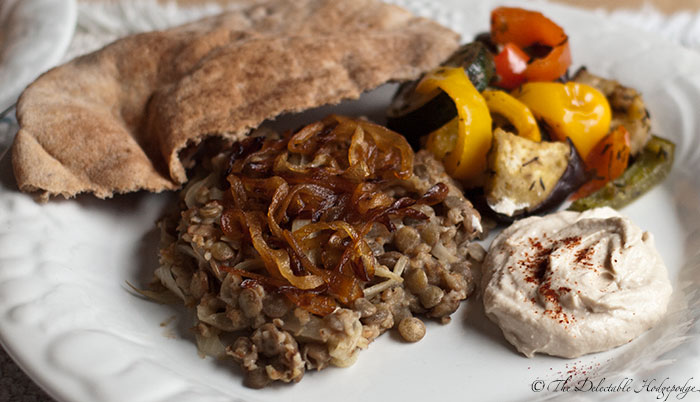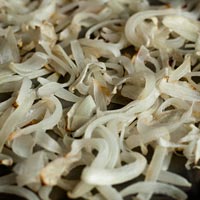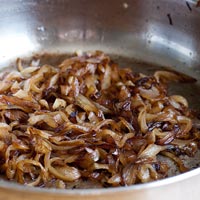
Mujaddara
| Ingredient | For Four | For Four |
|---|---|---|
| brown or green lentils | 1 cup | 1 cup |
| bulgur (coarse) | ½ cup | ½ cup |
| onions | 4 | 4 |
| olive oil | 2 + 4 Tbsp. | 2 + 4 Tbsp. |
| salt | 1 tsp. | 1 tsp. |
| pepper | to taste | to taste |
Mujaddara is a common Middle Eastern dish that can be pronounced or transliterated into English a wide variety of ways—mujadarah, mejadra, or even m’gadara—depending on the dialect. Consisting of nothing more than lentils, onions, and coarse wheat, it has been a staple of commoners dating back to the middle ages, but once you taste it you’ll find it hard to believe how delicious such a simple collection of ingredients can be. This version is based on a family recipe sent to us by Syrian reader Dana.
Preparation
- Remove the outside skin of the onions and cut off the roots and tops, then slice them into thin wedges.
- Wash and drain the lentils.
- Preheat oven to 300°F (150°C)
Directions
 Oven-dry two onions.
Oven-dry two onions.
Spread two of the sliced onions out in a layer on a baking sheet and dry at 300°F (150°C) for about an hour, stirring every 15 or 20 minutes. Alternately, you can stir-fry the onions until soft; it will be faster, but they are sweet and very tasty oven-dried. Caramelize other two onions.
Caramelize other two onions.
Sauté the other two sliced onions in a frying pan in 2 Tbsp. of olive oil until dark and fully caramelized, about 30-40 minutes; start at high heat, reduce to medium-low heat when there isn’t much moisture left in the onions, then finally for the last 10-15 minutes reduce to low heat and stir constantly to prevent them from burning.- Cook lentils.
Put the lentils and 3 cups of water in a large pan. Cover and bring to a boil, then reduce heat and simmer, covered, for 20 minutes, until they’re not quite completely cooked. - Season, add bulgur, and cook.
Add salt and pepper to lentils, then bulgur, then 4 Tbsp. of olive oil, and stir. Cover and simmer until all water has evaporated or been absorbed, about 20 minutes; the final texture should be somewhere between risotto and pilaf. - Add onions and serve.
Add the oven-dried onions and stir to mix, then remove from heat. Serve topped with caramelized onions.
Variation
Dana’s Original M’gadara
Dana’s original recipe calls for slightly different proportions and a somewhat different cooking technique. Whether the difference is due to a difference in the climate or ingredients where she lives versus the Pacific coast, or some other factor, her version turned out quite mushy here (though it was still very tasty).
- Deep fry onions.
Fry half of the onions in deep oil until they turn transparent. Deep fry the other half until golden and crispy. - Cook lentils.
Put 1 cup of lentils and 1 liter (4 cups) of water in a large pan. Cover and bring to a boil, then reduce heat and simmer, covered, for 30-45 minutes. - Add salt, bulgur, and olive oil, and cook.
Add 1 tsp. salt, ½ cup bulgur, and 4 Tbsp. of olive oil, and stir. Cover and simmer until all water has evaporated or been absorbed. - Add onions and serve.
Add the lightly-fried onions and stir to mix, then remove from heat. Serve topped with crispy onions.
Notes
- Middle Eastern dishes are usually served with pita bread, which goes well with this dish. Other good accompaniments are hummus and roasted herbed vegetables.
- Syrian Mujaddara calls for brown lentils, which can be confusing if you’re from the United States; in supermarkets here “brown” lentils (which are actually closer in color to tan or pale green) are usually sold as either “green” lentils or just “lentils” (not to be confused with “French lentils,” which are a darker green).
- Bulgur (also sometimes spelled bulgar or burghul) is a type of wheat common in Mediterranean and Middle Eastern cuisine; in the US it can usually be found in natural food stores, often in bulk. You want to use very coarse bulgur for this recipe.
- The sweeter the onions you use, the better.
- Dana notes that you can substitute a half-cup of dry white rice, washed, soaked, and drained, for the bulgur. If you’re using rice, it may take longer to cook; if you feel like it needs more water, you can add extra and cook it longer, as necessary.
